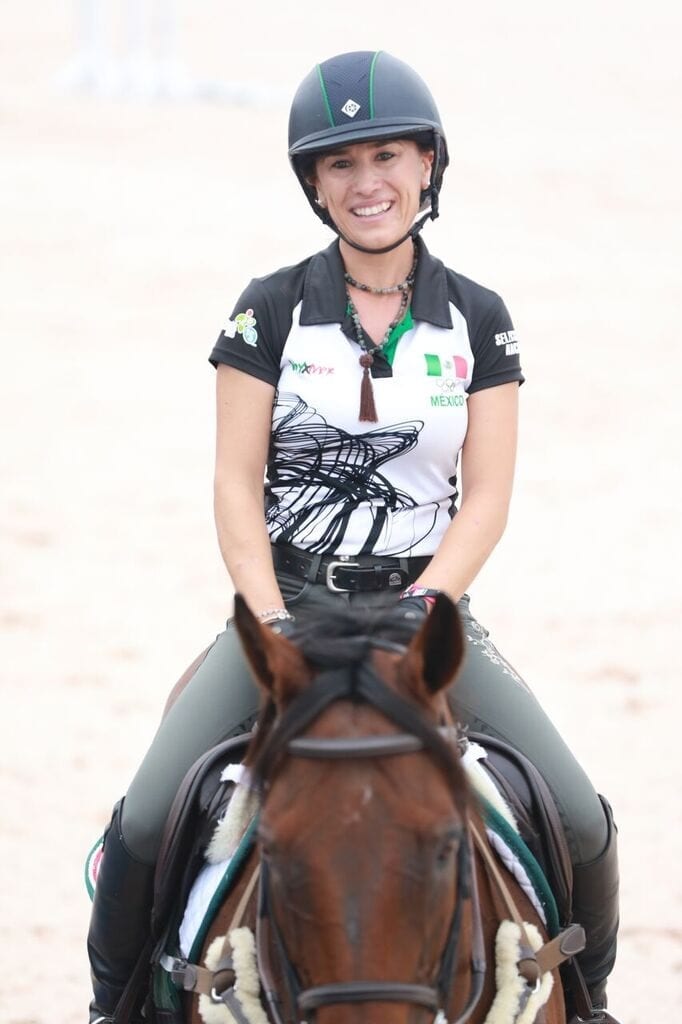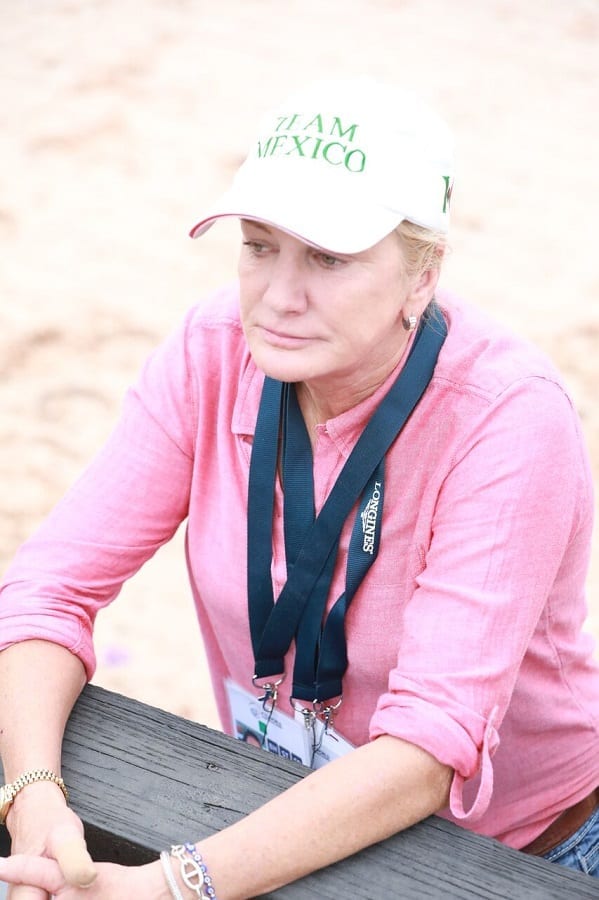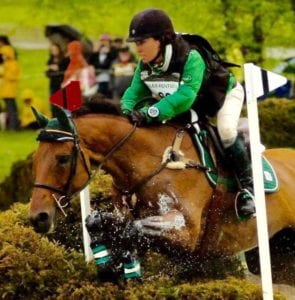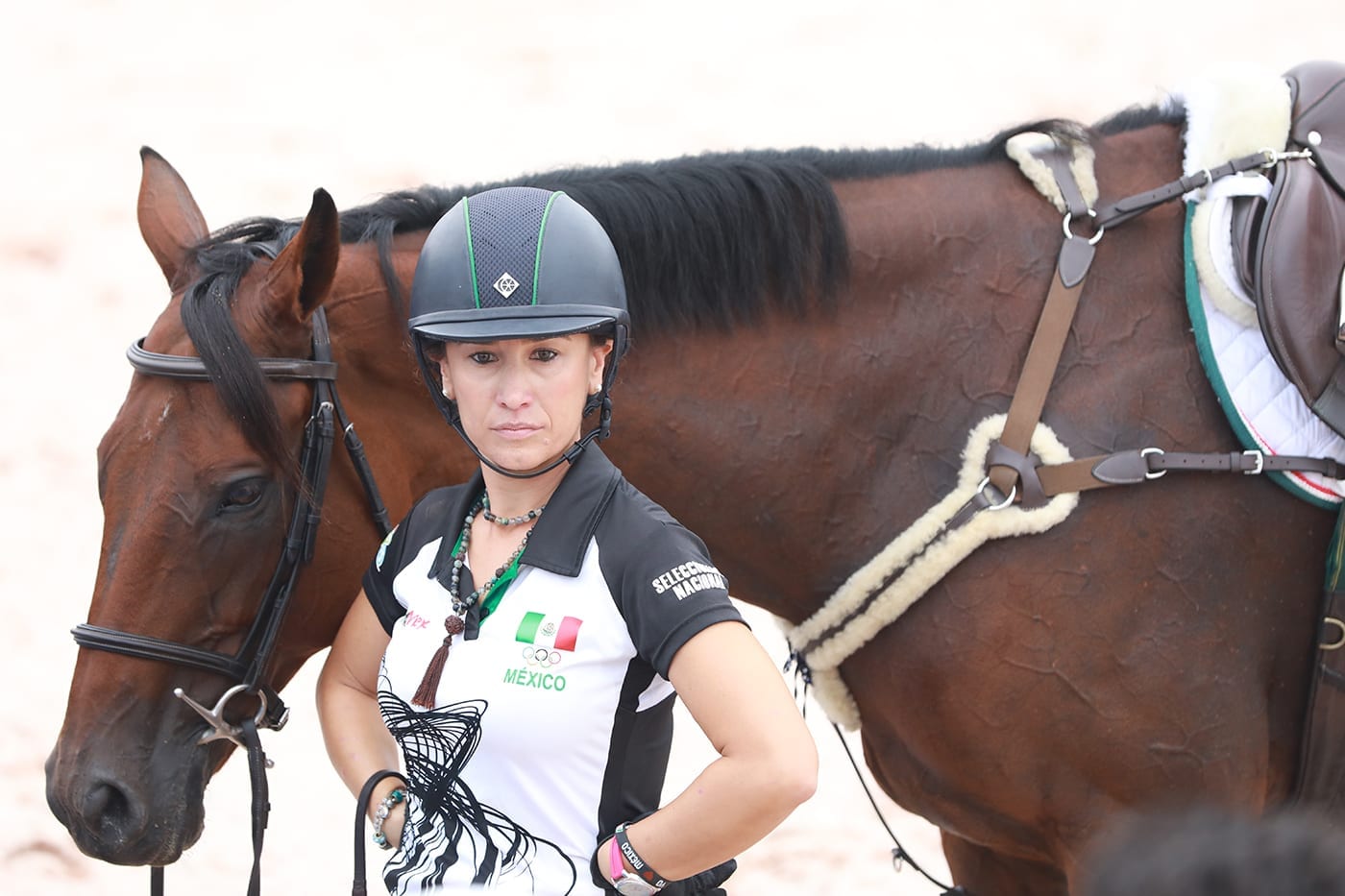By Rebecca Carr
 As the FEI World Equestrian Games™ Tryon 2018 approached, friends and family would ask Daniela Moguel if she was nervous about competing against the world’s top eventers as the only athlete to qualify from Mexico in the eventing competition. How, they asked, could she possibly compete and take care of her own horse without a groom while more affluent countries had a team of grooms for their athletes?
As the FEI World Equestrian Games™ Tryon 2018 approached, friends and family would ask Daniela Moguel if she was nervous about competing against the world’s top eventers as the only athlete to qualify from Mexico in the eventing competition. How, they asked, could she possibly compete and take care of her own horse without a groom while more affluent countries had a team of grooms for their athletes?
Questions, questions, questions.
Moguel remained cool and calm. “It’s just going to be another show,” she would tell them.
But when Moguel walked into the Tryon International Equestrian Center on September 8th, she started to tear up. Rows of international flags flapped in the wind against the backdrop of the Blue Ridge Mountains. As athletes from all over the world settled their horses into 1,200 permanent stalls, she felt a jolt of adrenaline, a sense of pride. This was it. She had made it and was finally at what many equestrians see as bigger than the Olympics.
Held every four years during the middle of the Olympic cycle, the games are one of the largest sporting events in the world, drawing some 500,000 spectators from more than 70 countries to compete in eight equestrian disciplines.
“I was so happy to be here. This is where I have always wanted to be,” said Moguel, over breakfast at Roger’s Diner at the equestrian center after an early morning lesson with her trainer the Olympian Karen O’Connor. “Tryon is the one of the finest venues in the world. It is all about the horse here and you can see it from the footing in the rings to the stalls to the beautiful buildings and the cross country course. I love it here.”
The Road to WEG
Moguel knew she wanted to go to the highest level of her riding from the time she was a kid riding a short, fat pony named Smurf (because he looked like the cartoon character) at a barn in Mexico City. “He taught me how to ride.”
But getting there was a challenge because there is virtually no government funding for civilian equestrians in Mexico. That meant that Moguel had to raise the money to pay her own way to compete at major competitions like WEG or Rolex. Moguel estimates that she spends about $100,000 per year to compete at the highest level, which called a 4-star event.
Moguel’s parents, both psychologists, supported her passion as much as they could. They bought her first horse, Tequila, for her 15th birthday so that she could compete on the jumpers’ circuit where riders are judged on their ability to guide their horses over a series of jumps at high speed. Moguel loved the speed and tight turns of the jumpers division.

Olympian Karen O’Conner is now her coach and mentor.
That is, until one day, while competing at a local show, she spied a poster of a girl jumping over water. Who was this blonde-haired girl? She wondered, becoming transfixed by the thought of learning how to jump a horse over water, banks, logs and other obstacles on a cross country course.
“When I saw that image, it was like I got illuminated or something. I saw it and I just loved it,” she said.
Cross country is just one of three disciplines that eventers must master. Eventing requires riders to steer their mounts through a series of prescribed classical movements called dressage, race around a cross country course like the one in the poster and then beat the clock over stadium jumps.
The women in the poster turned out to be Karen O’Connor, Moguel’s current trainer and an equestrian legend. O’Connor has competed in five Olympic Games, three World Equestrian Games, and two Pan-American Games. She was named the number one ranked female rider in the world in 1993 and was honored as the U.S. Female Equestrian Athlete of the Year 10 times. She is now the coach of the Mexican equestrian team which includes civilians like Moguel and military riders.
It would be years before Moguel would officially met O’Connor, but she kept that memory locked in her head. She knew that she he had a lot of work to do to become an eventer.
At 18, Moguel came to the United States to work for as a student for Joy Pharr, who owns a horse farm in Shelby, N.C., about 30 minutes from the Tryon International Equestrian Center. Under Pharr’s tutelage, Moguel honed her eventing skills for a year.
“She came at 18-19, determined to succeed,” Pharr said. “She has followed her dream and is making it happen. You can’t do better than that in life.”
Moguel’s parents called her back to attend college when the year ended. But that did not last long. She quit to ride full time. “It was the only time my mother stopped talking to me in my life,” Moguel said. “It was tough, but I could not let go of my dream.”
After leaving college, Moguel made ends meet by teaching riding to children and adults at a El Mirador, a Mexico City farm owned by Aurelio Quinzaños and his wife, Maribel Alonso. Quinzaños is an eventer and Alonso, a dressage rider and judge, so they understood Moguel’s passion and played an integral role in helping Moguel develop her talent.
Over the decade that Moguel, now 36, spent at El Mirador, she met and married Zully Martinez. Initially, Martinez was afraid of horses but he overcame his fear to win Moguel’s heart. Now he rides, teaches and supports her eventing dreams.
Moguel competed at the two-star level in Mexico on Agave, a horse owned by Quinzaños. She rode Agave at the Central American and Caribbean Games, but she knew she needed a higher caliber horse to move to the next level of eventing.
 Martinez began searching an online websites for horses. One night, as the pair was about to go to sleep, he came across Cecelia, a 16-hand thoroughbred mare in Virginia with proven credentials at the three-star level of competition.
Martinez began searching an online websites for horses. One night, as the pair was about to go to sleep, he came across Cecelia, a 16-hand thoroughbred mare in Virginia with proven credentials at the three-star level of competition.
Martinez had a “gut” instinct that Cecelia was the horse for his wife. “This is your horse! Seriously, you have to have this horse!” Martinez recalls telling her. At first she resisted, saying it was too much money. But, Martinez pushed. After watching a video of Cecelia, Moguel wanted to see more. She liked it but was worried about the money and whether they could afford her. The pair left a few days later to see the horse.
“The second I was on her, I knew she was it, she was a match made in heaven,” Moguel said. “It was like the way you know the person you are going to marry. It was just the perfect horse.”
Buying a top-level eventing horse can be tricky. The horses have to be able to endure competing in three disciplines over three days. They can’t just be good at dressage. They have to be able to master challenging cross-country courses with jumps that look like houses and steep banks that go into a pool of water and you have speed for the stadium jumping portion of the competition.
But Moguel and Martinez had a problem: they simply did not have the money to buy Cecelia.
But this is where things in Moguel’s life seemed to click.
Quinzaños and Alonso, who had already let her ride their horses and teach at their farm, joined as partners to help Moguel purchase the horse of her dreams. The 2014 purchase made it possible for Moguel to catapult into the highest level of eventing at the Pan American Games and the 2016 Rolex Kentucky. Eventually, Moguel was able to raise the money from her family to buy out Quinzaños and Alonso’s share. Moguel and Martinez now own Cecelia outright.
To prepare for the competitions, Moguel started training with Karen O’Connor, the same woman from the poster all those years ago and the trainer of her dreams. Moguel credits Karen with helping her improve enough to go to the next level by taking her back to the basics of equitation.
“She has been the key to my success as a rider,” Moguel said. “She is an amazing trainer and I have learned so much from her.”
Moguel is now the first civilian female rider on the Mexican eventing team. The first Mexican to compete at Rolex. And she is the first Mexican eventer to make it to the World Equestrian Games.
“Dani is an exceptional talent and she has an exceptional personality,” O’Connor said. “But what is really extraordinary is her relationship with her horse.”
Representing Mexico
Moguel and Martinez were about to land in Mexico City on September 19, 2017, when their plane suddenly diverted from its course. A powerful earthquake had struck Mexico City just minutes before. It was the worst earthquake to strike Mexico’s capital in decades: a magnitude of 7.1. Dozens of buildings collapsed in a matter of seconds, leaving 228 dead and many stranded without shelter.
The plane landed at a nearby airport. But rather than head home, the pair immediately went to the site of the earthquake to help people. They formed a human chain at 1 a.m. to remove debris and hand out food and water.

“I couldn’t stop crying. I cannot explain to you. There are no words. It was the saddest thing. All these people who had lost everything, their homes, everything, the saddest thing is that so many are still in the streets because the government says it has no money.”
It was then that Moguel saw the older lady, a lady wearing tattered clothes. The woman, somewhere in her 80’s, clearly did not have much money, but she had found a way to make a large vat of coffee and was handing it out to everyone who was helping at the site of the earthquake. Moguel took a cup and suddenly became overwhelmed. She cried from the sheer humanity of the woman’s kindness.
At the time, Moguel was angry with the Mexican government because it does not provide financial support to civilian equestrian athletes in the same way that other countries do. Seeing a woman, who had so little, find a way to give to others amidst an earthquake, made that anger dissipate.
“I knew that she was my people and that I would do everything in my power to make her proud,” Moguel said.

